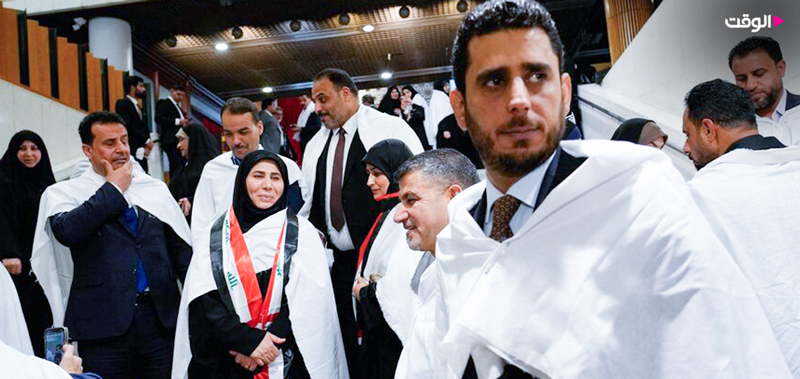Alwaght- Nearly seven months after the parliamentary elections, Iraq still grapples with a deadlock in its efforts to form a new government. On the one side stands the Sadrist Movement and its Sunni and Kurdish allies that still insist on forming a national majority government and on the other side stands the Shiite Coordination Framework (SCF) that wants a government including all political parties. The failure by each of these sides has created a blind political knot, leaving no clear outlook for a settlement.
The National Salvation coalition, which was announced on March 23 in a conference and covers the Muqtada al-Sadr-led Sadrist Movement, Masoud Barzani-led Kurdistan Democratic Party (KDP), and the Sovereignty Bloc led by Mohammed al-Halbousi and Khamis Khanjar, on March 30 gave the rival SCF 40 days to form a government after it failed to form a new cabinet.
But after al-Sadr's 40-day deadline expired, he launched an initiative to give the independent lawmakers, who are 40 of total 329, to form government. In his new plan, al-Sadr called on the independents to form a new government within 15 days. However, all the evidence indicates that the 40 independent representatives are not willing to join the coalition with any of the SCF or Sadrist Movement.
The SCF several times repeated its call for an inclusive government incorporating all parties into a cabinet but the National Salvation rejected the offer. The opposite views have pushed the political crisis in Baghdad to its peak now. This crisis, in turn, paves the way for larger and more complicated political, security, and even cultural crises.
Declining public trust in the political system
In the long run, the political stalemate created by the differences between the SCF and the National Salvation coalition has no winner. Undoubtedly, the current crisis does not distinguish between the good and bad sides and its consequences impact all. To test the veracity of this claim, we can look how the deadlock in the past few months left public disappointed with and indifferent to the political process. The public indifference as a sociological factor means decrease in the trust which in turn means decrease in the legitimacy of the government and political system. Fed up with the useless, unending political competitions, the citizens not only seek no champion to lead them to exit from the crisis but also conclude that rivalry of one party with the others does not serve the public interests.
Decrease in political system's efficiency
Ongoing political predicament also results in decline in the political system's efficiency in addition to public confidence. In socio-political studies, the search for roots of popular protests and revolutions finds an essential factor: efficiency of the political system. That a political system at minor, medial, and major levels to what extent can manage the crises is a very important matter. Currently, the Iraqi political system is badly defective in this factor.
The crisis associated to the failure to form a new government and lack of a clear outlook for future management stability strikingly impacts the medial and top-level managers' power to program for settling the economic, social, and even environmental challenges. The economic corruption rate in the Iraq is also one of the highest in the world. The government is hapless seeking a solution to the dust storms marring the ordinary life in the country in the past few months. The high youth unemployment rates, growing poverty, dispute with Kurdish region, and various social crises are burdens on the shoulder of a government that has never had a firm position and cannot manage the critical conditions.
Suspension in pursuing expulsion of American forces
Another negative implication of the political stalemate in Iraq is the suspension of agenda pursuing expulsion of the American troops. In late last year, the government of PM Mustafa al-Kadhimi announced that the last American troops already withdrew from Iraq but after five months from 2022, the occupation forces still exist on the Iraqi soil and even conduct operations. Though al-Sadr insists that the American occupation must end, his push to foist his agenda on the other political factions would play into the hands of the Americans and suspend the crucial national project to expel the occupation troops.



























